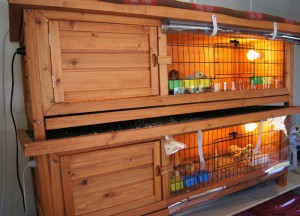Raising Chickens
Starting out things to remember when Raising Chickens
When you start raising chickens for fresh eggs for the home, most families start with the cute and fluffy little chickens. There is nothing like seeing the look on a child’s face when they hold a young chicken for the first time. There are many things that you need to remember when raising chickens.
 Recommended Reading: Step-by-step guide to raising chickens at home.
Recommended Reading: Step-by-step guide to raising chickens at home.
Housing your Baby Chickens
Chickens need to be kept warm and healthy. For warm I use a light bulb either hanging on the side of a box or mounted into the box. In the first week I use a large plastic drum that can be easily bought from places like essentials or crazy clarks etc. On the floor of the chicken box I put a layer of sawdust, but there is other products that can be used. (rice hulls) Newspaper tends to be a bit hard on their little feet. The same is said for dry grass clippings or straw. The bedding you choose will need to be changed every 2 or 3 days to help keep a disease free area.
For warm I use a light bulb either hanging on the side of a box or mounted into the box. In the first week I use a large plastic drum that can be easily bought from places like essentials or crazy clarks etc. On the floor of the chicken box I put a layer of sawdust, but there is other products that can be used. (rice hulls) Newspaper tends to be a bit hard on their little feet. The same is said for dry grass clippings or straw. The bedding you choose will need to be changed every 2 or 3 days to help keep a disease free area.
 Your box or container needs to be at least 30 cm high so that your chickens don’t make a habit of escaping their enclosure. I would recommend putting a piece of wire netting on the top of the box to ensure the chickens are safe and rats and mice cannot get into the chickens.
Your box or container needs to be at least 30 cm high so that your chickens don’t make a habit of escaping their enclosure. I would recommend putting a piece of wire netting on the top of the box to ensure the chickens are safe and rats and mice cannot get into the chickens.
Both of these chicken pens pictured, I have outfitted to suit my requirements. As you can see the younger chickens on the lower level have their plastic cover closed to help keep in the warm. These chickens are only a few days old. The penthouse level currently is housing chickens approx 1.5 weeks old. They can now handle having their curtain up. Raising the chickens in boxes like this, you can keep better control of the temperature.
Feeding your Chickens
Many different breeders would have a lot of ideas on how to feed your chickens. I prefer buying Chicken Starter (chicken crumble). It provides a balanced mix of protein ( 18-21%) and nutrients which will give your chickens a good start in life. A balanced mix allows for good growth in chickens. If you are looking at going with organic feed for your chickens try and avoid crushed or rolled oats as this causes bowel problems. You can provide green vegetables like spinach or silverbeet or even a bit of grass can add valuable vitamins and minerals needed for your chickens to grow strong. Try to avoid chicken food with too high protein content, as this can lead to other problems like a disease called coccidiosis.
Older Chickens
You must never put your young chickens in with older chickens especially if they are bigger. They will bully the young chickens and sometimes even cause death. When they are big enough to escape from the wrath of the bullies then you can consider putting them in with the older chickens. This is not normally until they are 10 to 15 weeks old. I never introduce my chickens to the older poultry until they are 3 months old. This gives them a fair chance of moving away from the bossy or bully chooks. If your chickens become stressed from a hen that not in a good mood, then they can become ill or suffer lesions.
Larger breeds are a bit slower and cannot chase the young chickens as easily, and the smaller more energetic breeds have no issues cornering a young chicken and doing some serious damage
